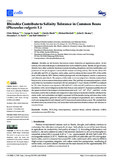Rhizobia Contribute to Salinity Tolerance in Common Beans (Phaseolus vulgaris L.)

View/
Date
2022-11-16Author
Wekesa, Clabe
Asudi, George O.
Okoth, Patrick
Reichelt, Michael
Muoma, John O.
Furch, Alexandra C. U.
Oelmüller, Ralf
Metadata
Show full item recordAbstract
Rhizobia are soil bacteria that induce nodule formation on leguminous plants. In the nodules, they reduce dinitrogen to ammonium that can be utilized by plants. Besides nitrogen fixation, rhizobia have other symbiotic functions in plants including phosphorus and iron mobilization and protection of the plants against various abiotic stresses including salinity. Worldwide, about 20% of cultivable and 33% of irrigation land is saline, and it is estimated that around 50% of the arable land will be saline by 2050. Salinity inhibits plant growth and development, results in senescence, and ultimately plant death. The purpose of this study was to investigate how rhizobia, isolated from Kenyan soils, relieve common beans from salinity stress. The yield loss of common bean plants, which were either not inoculated or inoculated with the commercial R. tropici rhizobia CIAT899 was reduced by 73% when the plants were exposed to 300 mM NaCl, while only 60% yield loss was observed after inoculation with a novel indigenous isolate from Kenyan soil, named S3. Expression profiles showed that genes involved in the transport of mineral ions (such as K+, Ca2+, Fe3+, PO43−, and NO3−) to the host plant, and for the synthesis and transport of osmotolerance molecules (soluble carbohydrates, amino acids, and nucleotides) are highly expressed in S3 bacteroids during salt stress than in the controls. Furthermore, genes for the synthesis and transport of glutathione and γ-aminobutyric acid were upregulated in salt-stressed and S3-inocculated common bean plants. We conclude that microbial osmolytes, mineral ions, and antioxidant molecules from rhizobia enhance salt tolerance in common beans
URI
https://doi.org/10.3390/cells11223628https://www.mdpi.com/2073-4409/11/22/3628
http://ir-library.mmust.ac.ke:8080/xmlui/handle/123456789/2334
Collections
- Gold Collection [1031]
